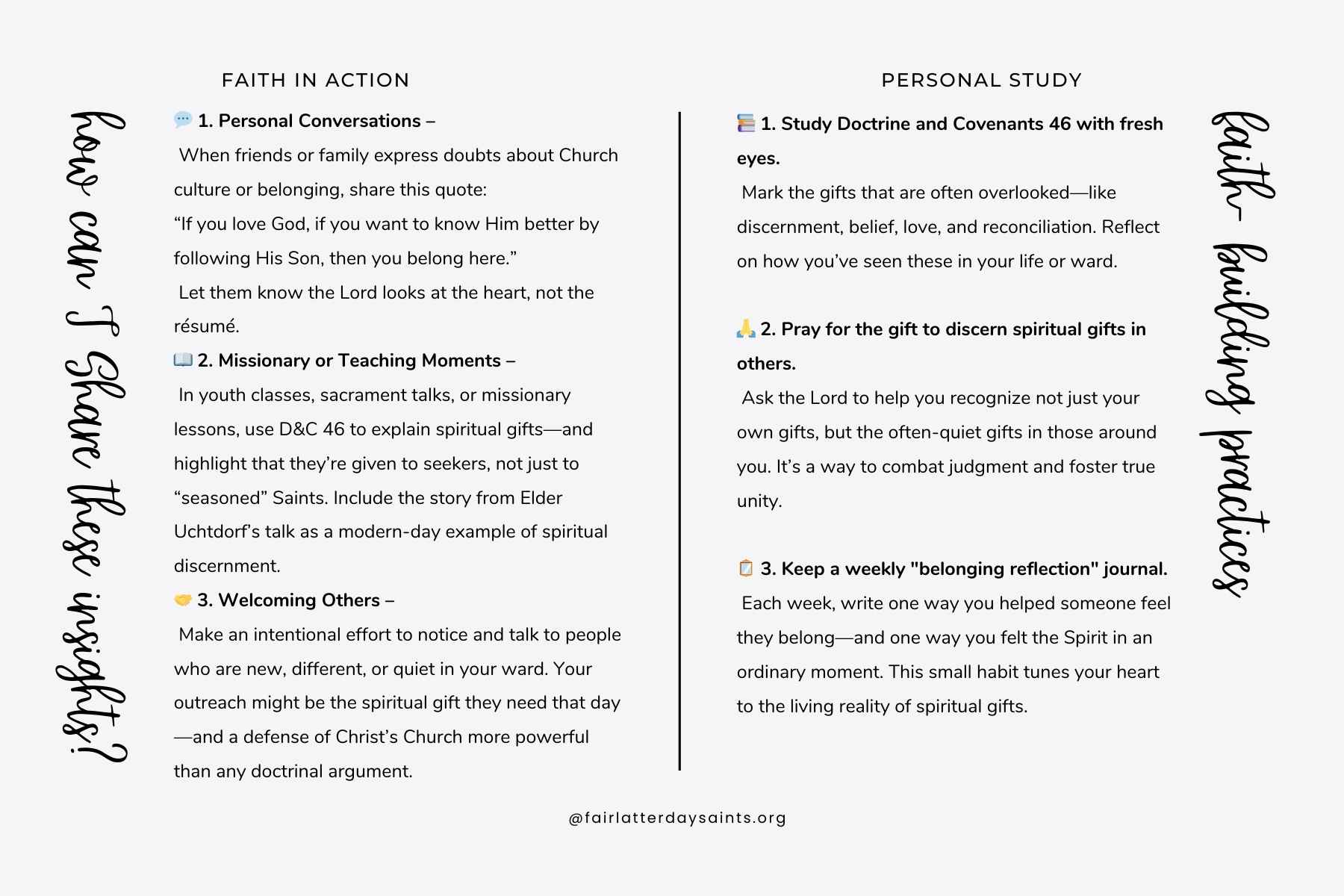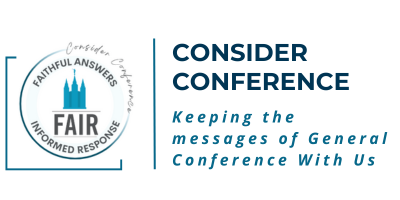
Welcoming the Spirit, Discerning the Gifts, and Embracing Every Seeker
Have you ever wondered what truly draws people to the restored Church of Jesus Christ—not just doctrinally, but spiritually?
In his Christ-centered address, By This All Will Know That You Are My Disciples, Elder Dieter F. Uchtdorf reminds us that the most powerful witness we offer the world is how we treat each other. As he shares a personal story of a nonmember friend discerning the Spirit in a humble sacrament meeting, he bears testimony that spiritual gifts are real, that discernment matters, and that the Lord’s Church must be a place of belonging for all who seek Him.
In a time when critics question the sincerity of spiritual experience or the openness of our worship, Elder Uchtdorf invites us to see through the eyes of faith—to recognize God’s hand in simple gatherings, imperfect people, and heartfelt love. How can we become better at discerning the true gifts of the Spirit? And how can we ensure that all of God’s children feel at home among His disciples?
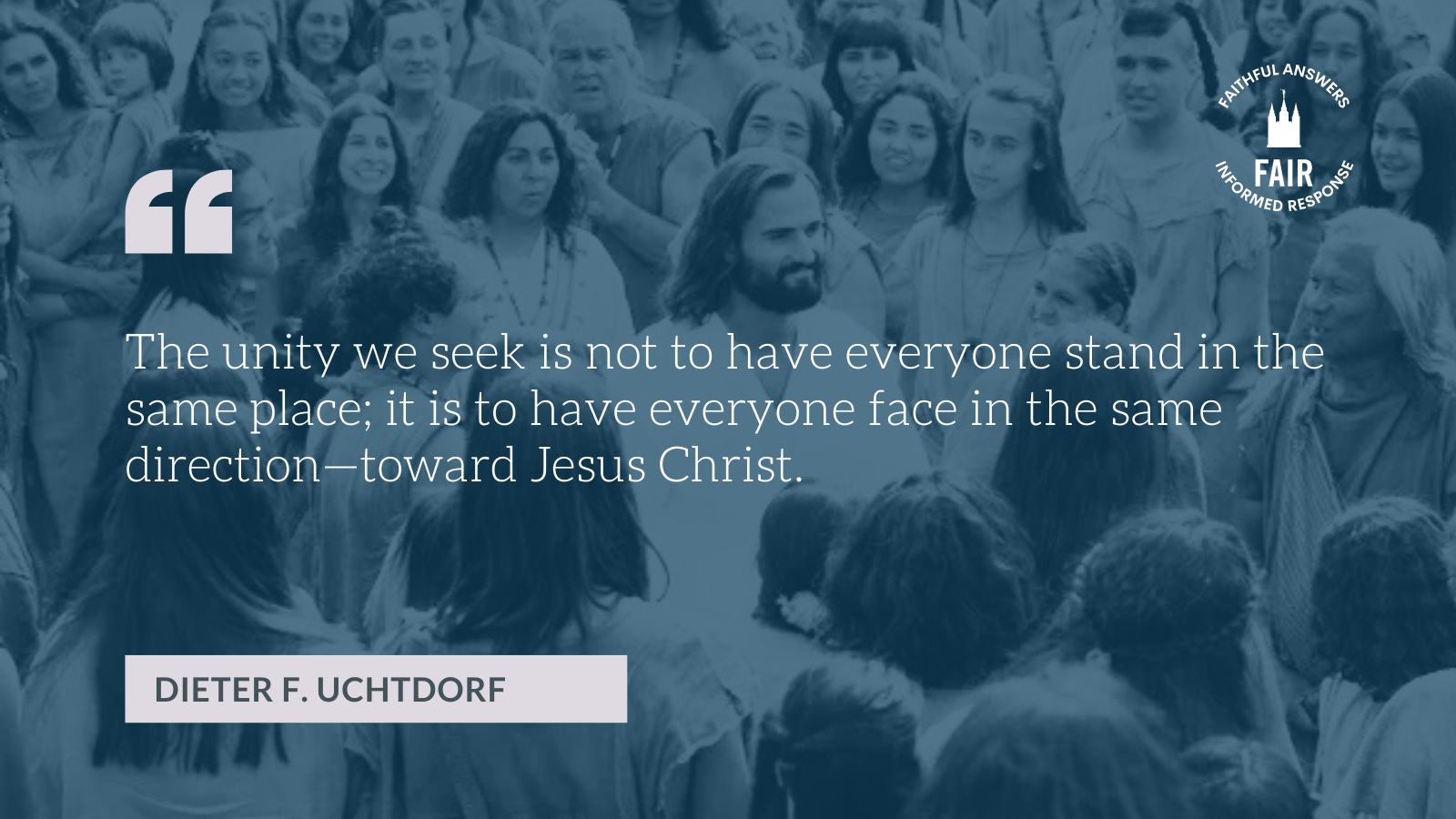
Apologetic Issues: Spiritual Gifts and the Boundaries of Belonging
Misconception: People should be fully prepared—doctrinally and culturally—before they attend or participate in our worship.
Response:
The Lord’s standard is clear: all sincere seekers are welcome. In Doctrine and Covenants 46:5–6, He commands the Saints not to cast out anyone earnestly seeking the kingdom, even if they are not yet members. Elder Uchtdorf reinforces this doctrine, stating:
If you love God, if you want to know Him better by following His Son, then you belong here.
While many congregations do a beautiful job of welcoming visitors and converts, challenges can still arise—especially when someone’s background, race, lifestyle, or unfamiliarity with “Church culture” sets them apart. Some members may quietly question whether that person is “ready” for Church participation or fitting in “appropriately.” But such assumptions risk imposing our comfort in place of God’s invitation.
The Lord sees differently. He looks not on outward appearance or cultural alignment, but on the heart (1 Samuel 16:7). Creating spiritual belonging is not about people earning a place—it’s about disciples creating space.
Common Fallacy: Gatekeeping Fallacy
This concern reflects the Gatekeeping Fallacy, where individuals wrongly assume authority to decide who truly belongs in a space meant to be open. It often confuses readiness for ordinances (which do have standards) with worthiness to worship, which the Lord extends to all who seek Him.
Solution: While ordinances are sacred and require preparation, worship is an open door. When we build walls where the Lord has commanded a welcome, we unintentionally resist His will. Inclusion is not an indulgence—it is obedience.
Misconception: Are ‘spiritual gifts’ just emotional experiences?
Response:
Spiritual gifts are not vague feelings; they are scripturally grounded manifestations of the Holy Ghost. Elder Uchtdorf illustrates this in recounting how a visiting friend discerned divine love in a humble branch meeting—not through performance, but through the Spirit.
Doctrine and Covenants 46:13–26 identifies specific gifts, including wisdom, knowledge, discernment, faith, healing, and the ability to recognize truth. The Lord also warns against deception (vv. 7–8), underscoring the need to seek the Spirit in humility and avoid counterfeit emotionalism.
Common Fallacy: Reductionism
This concern reflects the Reductionist Fallacy, which oversimplifies spiritual experiences as mere emotion. In doing so, it dismisses the divine dimension of the gifts of the Spirit.
Solution: Not all emotions are spiritual—but spiritual experiences often involve the heart. The Lord teaches that He communicates through both the mind and the heart (D&C 8:2). Discipleship invites us to engage intellectually and spiritually, discerning true gifts from passing sentiment.
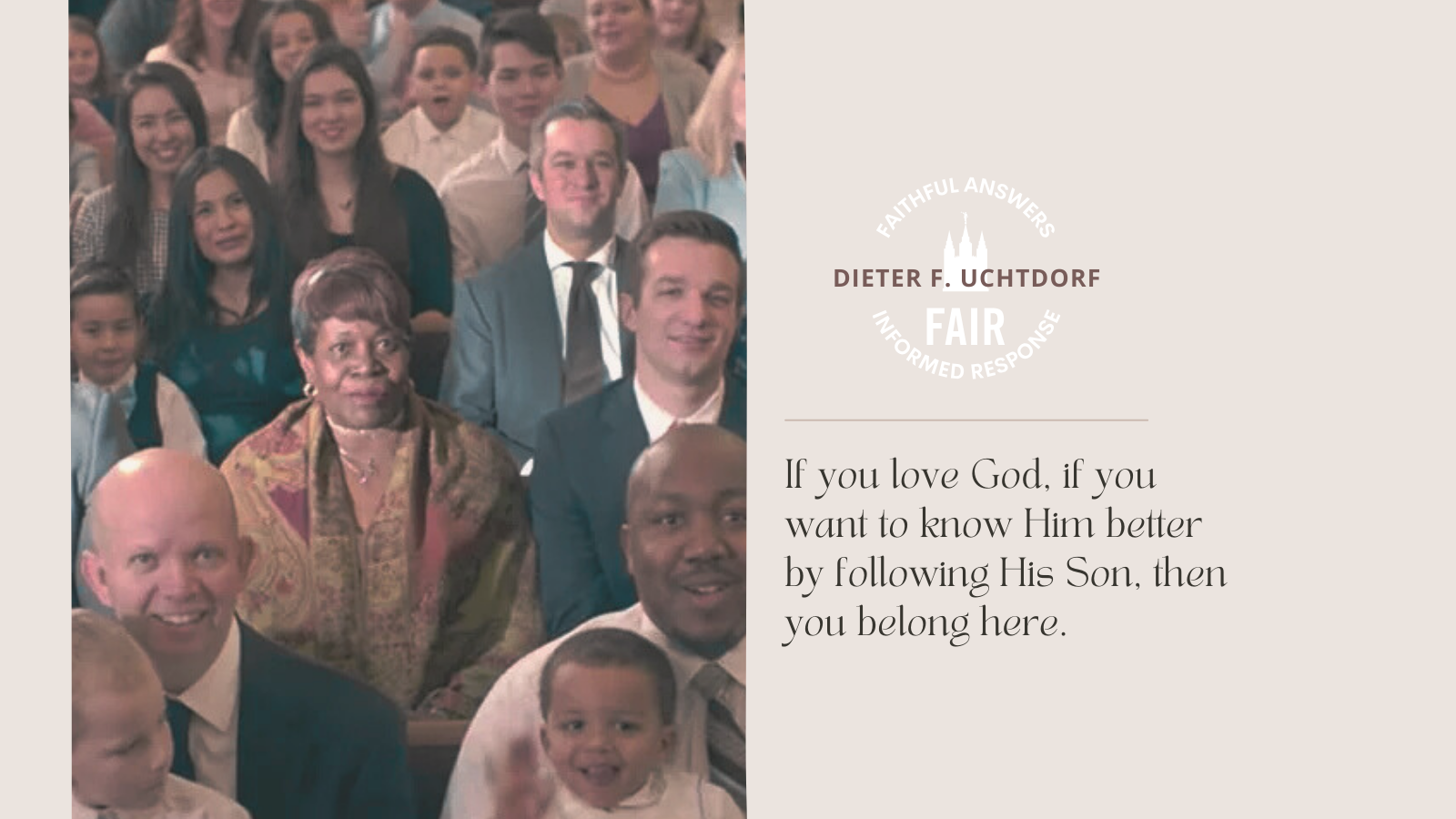
Apologetic Application: Spiritual Gifts and the Power of Divine Discernment
 Core Doctrine: spiritual gifts are real, divinely given, and meant to benefit all sincere seekers
Core Doctrine: spiritual gifts are real, divinely given, and meant to benefit all sincere seekers
Elder Dieter F. Uchtdorf’s talk, By This All Will Know That You Are My Disciples, puts that principle into action. Rather than listing gifts, he shows how they function: through quiet spiritual discernment, sincere love, and the unifying power of the Spirit.
Defending Core Beliefs
1⃣ Spiritual Gifts Are Recognized Through the Spirit, Not Performance
D&C 46:13–14 teaches that to some it is given to know Christ is the Son of God, and to others, to believe on their words. It goes on to describe the gift of discernment (v. 23)—the capacity to spiritually perceive truth even when it’s not outwardly obvious.
Elder Uchtdorf recounts taking a nonmember friend to a sacrament meeting that was, in his words, awkward and imperfect. Yet she said afterward:
“That was beautiful… I’m so impressed with how people treat each other in your church. … This is what I imagine Christ wanted His Church to be like.”
Though unfamiliar with our doctrines, she discerned the Spirit. This affirms the truth of D&C 46:9: “They are given for the benefit of those who love me and keep all my commandments, and him that seeketh so to do.” Her seeking was enough to receive a spiritual witness.
2⃣ Disciples Are Commanded to Seek and Discern Gifts—and to Make Room for Them in Others
D&C 46:7–8 warns that not all spiritual manifestations are from God—and teaches us to “seek ye earnestly the best gifts” and remember why they are given. Elder Uchtdorf models this discernment when he recognizes that his own judgment was clouded by superficial expectations—and his friend’s clarity came through spiritual insight.
“I had wanted picture-perfect meetings… But what the members of this branch had achieved was a heart-perfect spirit of love.”
This teaches that spiritual gifts may appear in humble, even unexpected, settings—and that belonging and discernment are themselves gifts that must be both recognized and cultivated.
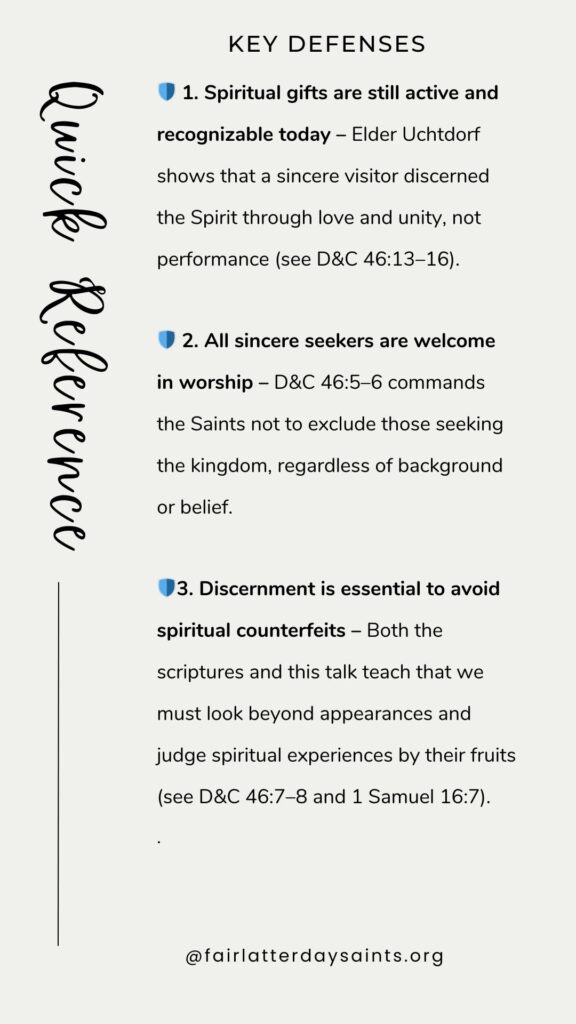 Clarifying Misunderstandings & Strengthening Faith
Clarifying Misunderstandings & Strengthening Faith
- Spiritual gifts are not reserved for seasoned Saints—they are available to all who seek the Savior, even visitors and newcomers.
- Discernment does not require dramatic revelation; it often manifests as quiet spiritual perception, as Elder Uchtdorf’s friend experienced.
- Inclusivity is doctrinal. The Lord commands us in D&C 46:5–6 not to cast out any who are “earnestly seeking the kingdom”—regardless of background, race, doctrinal fluency, or cultural fit.
Historical and Doctrinal Connections
 Contextual Background:
Contextual Background:
In early 1831, just months after the Saints had begun gathering in Kirtland, spiritual confusion was growing. Newly baptized converts—many from revivalist backgrounds—were introducing chaotic practices into worship meetings. Some claimed dramatic visions, speaking in tongues, or ecstatic trances. Joseph Smith inquired of the Lord, and Doctrine and Covenants 46 was the answer.
Rather than forbidding spiritual experience, the Lord affirmed the reality of spiritual gifts, while teaching the Saints how to discern what was of God and what was not. Importantly, He also gave a bold command: do not cast out sincere seekers from your meetings. This directive pushed against social instincts to exclude or control and instead emphasized trust in divine guidance and spiritual openness.
Elder Uchtdorf’s talk echoes this moment perfectly. In a modern setting, he demonstrates how even humble worship, guided by love and sincerity, is a place where spiritual gifts are manifest and seekers are welcomed.
 Doctrinal Connections:
Doctrinal Connections:
- Doctrine and Covenants 46:5–6: “Ye shall not cast any out of your sacrament meetings who are earnestly seeking the kingdom…” Elder Uchtdorf reinforces this scriptural command with Christlike warmth:
“If you love God, if you want to know Him better by following His Son, then you belong here.” - Doctrine and Covenants 46:13–26: This list of spiritual gifts includes wisdom, knowledge, discernment, healing, and faith—all meant “that all may be profited thereby.” Elder Uchtdorf’s friend, though not a member, exemplified the gift of discernment by recognizing divine love and belonging in an imperfect congregation.
- Doctrine and Covenants 46:8: “Seek ye earnestly the best gifts…” Elder Uchtdorf challenges modern disciples to recognize that the real miracle is love in action—a spiritual gift too often overlooked because it isn’t dramatic.
Through these connections, we see prophetic continuity: just as the Lord guided early Saints to balance spiritual openness with discernment, He continues to do so through His apostles today.
Living Apologetics: How to Apply This Today
How can we help others see that spiritual gifts are real and that everyone—regardless of background—belongs in the Savior’s Church?
1⃣ Affirm the reality of spiritual gifts—even when they look ordinary.
Elder Uchtdorf shows that a sincere visitor discerned the Spirit not through flawless music or eloquent talks, but through the gift of love in action.
 Real-life application: When someone questions whether they’ve “felt the Spirit,” invite them to describe moments of clarity, peace, or connection—they may already be experiencing spiritual gifts without labeling them as such.
Real-life application: When someone questions whether they’ve “felt the Spirit,” invite them to describe moments of clarity, peace, or connection—they may already be experiencing spiritual gifts without labeling them as such.
2⃣ Help others see that belonging doesn’t require perfection—or sameness.
D&C 46:5–6 and Elder Uchtdorf both insist: those earnestly seeking the kingdom should never be turned away.
 Real-life application: In gospel discussions or missionary efforts, gently correct the idea that people need to fit into an arbitrary ‘mold’ before attending Church or worshiping with the saints. Share your own story of growing while belonging.
Real-life application: In gospel discussions or missionary efforts, gently correct the idea that people need to fit into an arbitrary ‘mold’ before attending Church or worshiping with the saints. Share your own story of growing while belonging.
 Top Apologetic Facts
Top Apologetic Facts
 Historical Insight:
Historical Insight:
D&C 46 was revealed to address confusion over spiritual manifestations in early Kirtland. It confirmed the legitimacy of spiritual gifts while setting doctrinal boundaries for their use.
 Doctrinal Insight:
Doctrinal Insight:
Spiritual gifts like discernment, faith, love, and belief are just as real and vital as more dramatic manifestations—and are given to profit all (D&C 46:9, 26).
 Practical Application:
Practical Application:
True inclusion means removing cultural gatekeeping, not just tolerating difference. Belonging is a spiritual principle, not a social achievement.
Conclusion: Welcoming the Spirit, Welcoming Each Other
Elder Dieter F. Uchtdorf’s message is a gentle yet bold reminder that belonging is not a side effect of discipleship—it’s part of the invitation. As we study Doctrine and Covenants 46–48, we learn that spiritual gifts are given to all who seek Christ, and that one of the most powerful among them is the ability to help others feel seen, safe, and spiritually at home.
When we focus less on “guarding the gate” and more on “setting a place at the table,” we begin to reflect the Savior’s love more clearly. The sacrament meeting Elder Uchtdorf described wasn’t perfect—but it was Spirit-filled because it was filled with people who loved God and loved each other.
 Who in your life might be waiting for a place to belong—and how might you help them feel the Spirit through you?
Who in your life might be waiting for a place to belong—and how might you help them feel the Spirit through you?

Our love for God and His children is a powerful testimony to the world that this is truly the Savior’s Church.
The Consider Conference series by FAIR offers an in-depth look at recent General Conference talks to help members of the Church of Jesus Christ of Latter-day Saints navigate common questions, misunderstandings, and criticisms. Each post provides doctrinal insights, historical context, and practical ways to apply gospel principles in everyday conversations. Through this series, we hope to equip readers with faith-promoting resources that encourage thoughtful reflection, respectful dialogue, and a stronger foundation in gospel truths, fostering both personal conviction and meaningful discussions with others.
The post By This All Will Know That You Are My Disciples appeared first on FAIR.
Continue reading at the original source →




